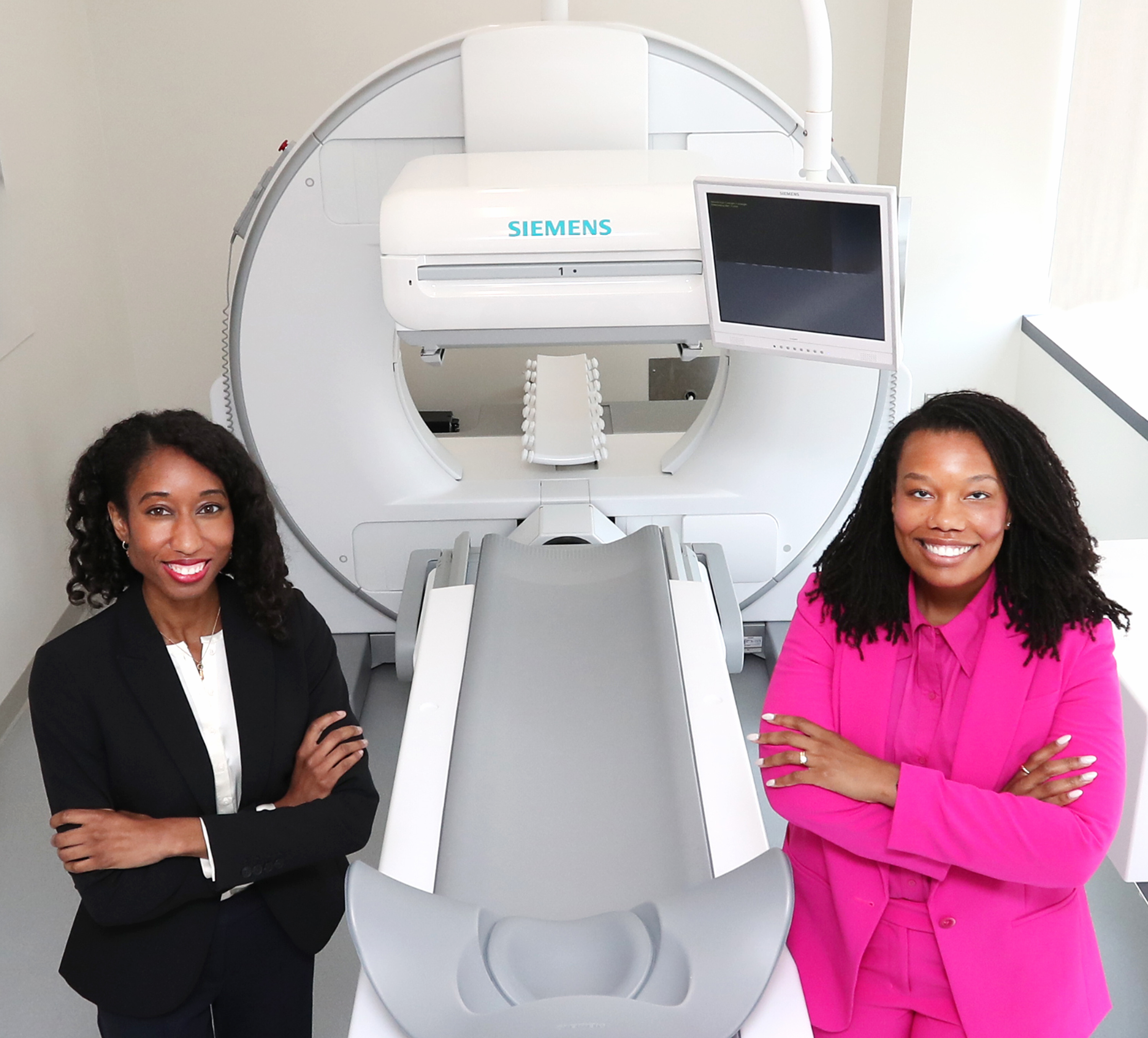VCU Nuclear Medicine Concentration Energized by New Faculty
Heidy Palacios and Charlie Downing arrive at The College of Health Professions ready to demystify nuclear medicine – and showcase the rewarding career paths awaiting graduates
By, Dan Carrigan

Heidy Palacios, MBA, director and assistant professor (left), and Charlie Downing, clinical coordinator (right) are pictured with the Siemens Symbia Evo Excel dual-head gamma camera system, which allows students to simulate nuclear medicine procedures in a controlled environment.
Central Virginia’s only Nuclear Medicine concentration - a part of the B.S. in Clinical Radiation Sciences degree program in the Virginia Commonwealth University College of Health Professions, has renewed energy with the addition of new faculty members who bonded on day one to educate and inspire students for careers they may not have thought possible.
VCU’s Department of Radiation Sciences recently welcomed Heidy Palacios, MBA, as director and assistant professor, and Charlie Downing as clinical coordinator for the Nuclear Medicine concentration. Palacios comes from Manhattan College in New York, where she was a nuclear medicine program director, while Downing joins from Riverside Health System, where she worked as a multimodality technologist.
“We are excited to have Heidy and Charlie join our team,” says Jeffrey S. Legg, Ph.D., chair and professor of the Department of Radiation Sciences. “Their expertise and enthusiasm for nuclear medicine will greatly benefit our students and contribute to the advancement of our program.”
“Nuclear medicine technology plays a vital role in health care by offering non-invasive imaging and functional assessments essential for diagnosing, planning treatments, and monitoring a variety of medical conditions,” Legg adds.
Housed in the College of Health Professions on the MCV Campus, the Department of Radiation Sciences offers a unique Bachelor of Science degree with a concentration in Nuclear Medicine Technology.
Nuclear medicine is a specialized field of medical imaging that uses small amounts of radioactive materials to diagnose and treat diseases. This technology provides critical insights into the functioning of organs and tissues, aiding in the diagnosis of conditions such as cancer, heart disease and bone disorders.
Palacios and Downing admit it may sound daunting, but they encourage prospective students to consider the field. Palacios, who herself switched majors from chemistry to nuclear medicine as an undergraduate, says helping patients is why she entered nuclear medicine. "I wanted something that, for me, was more proactive, more helping patients. I had a passion for just being one-on-one with patients. That's how I went into nuclear medicine.”
“It incorporates the functional aspect, which makes it so interesting. All you really need is a love for science and math in order to really engage with and be part of the nuclear medicine community.”
Downing, who found her passion for nuclear medicine unexpectedly, aims to demystify the field and make it accessible. "My goal here as clinical coordinator is to make nuclear medicine more approachable, more fun,” Downing says.
“It's definitely for people who like the sciences, they are creative. If you're a curious person, if you're interested in looking under the hood a little bit, that's what nuclear medicine is," she explains.
To train the current and future nuclear medicine workforce, the program’s expert faculty is supported by state-of-the-art technology, including the Siemens Symbia Evo Excel dual-head gamma camera system. This technology allows students to simulate nuclear medicine procedures in a controlled environment. Additionally, the department offers computer workstations with advanced software for processing nuclear medicine images and performing quantitative analysis. A fully equipped radiopharmacy “hot lab” provides hands-on experience with radiopharmaceuticals, enhancing students' practical skills.
The Nuclear Medicine Technology concentration at VCU is accredited by the Joint Review Committee on Education in Nuclear Medicine, ensuring that the program meets high standards of education and training. Graduates can pursue various career paths, including roles as nuclear medicine technologists, radiation safety officers, and positions in research labs. They may also explore opportunities in health care administration or with vendors supplying radiopharmaceuticals and equipment.
"We want the students to be successful, competent technologists, not just educationally but also in clinical settings. Our curriculum has a solid foundation, and we aim to build on that," Palacios says.
What’s next? Both Palacios and Downing are committed to fostering strong clinical relationships in the region, state and beyond.
"Nuclear medicine is growing," Downing notes. "We’re advancing into more oncology theranostics and personalized medicine."
A well-rounded educational approach to the field offers rewarding careers both within and beyond hospitals and clinics. For students, this means entering a high-demand field through a VCU program that boasts a 100 percent job placement rate.
“There's so many opportunities,” Palacios says.